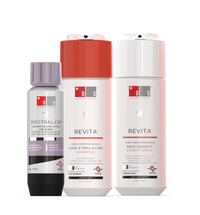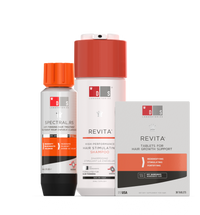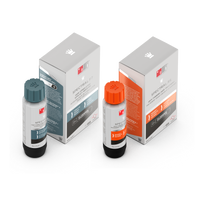Hair is an integral part of our identity. It can also be a direct reflection of our physical health and wellbeing. Hair can reflect a number of physical factors in your body including poor diet, stress, dehydration, and medical conditions. Indeed, your hair can even reveal if your hormones are off-balance. Estrogen is one hormone that plays an important role in your hair health. Let’s take a look at what estrogen does for your hair and how to correct hair thinning from low estrogen.
Can Low Estrogen Cause Thinning Hair?
Translation missing: en.blogs.article.author_on_date_html
What is estrogen?
Estrogen is the primary female sex hormone that is essential for sexual and reproductive development. Although it is present in small amounts in men, estrogen is one of the key biochemical ingredients that makes women biologically female.
Estrogen is responsible for numerous processes in women. For example, estrogen helps:
- Regulate metabolism
- Bone health
- Sexual development in puberty
- Growth of the uterine lining
- Breast development in puberty and growth in pregnancy
- Develop secondary sex in puberty including wide hips and armpit hair
- Growth of thick, full hair
In looking through a biochemical lens, estrogens are comprised of a group of three chemically similar hormones: estrone, estradiol, and estriol. The ovaries are the main site for estrogen production, although fat cells and the adrenal glands can produce estrogens in small quantities.
What can cause low estrogen?
While hormonal imbalances can occur in women or men, women are more likely to experience fluctuations in their hormones. Some hormone fluctuations are normal. For example, puberty, pregnancy, postpartum, and menopause are natural phases in a woman’s life where hormone levels surge or decline.
Many women notice their hair thins significantly after childbirth and in menopause. Indeed, these are phases in a woman’s life where estrogen levels dip drastically to support changes in the reproductive system. In postpartum, women report their hair tends to thin considerably 3-6 months after delivery. Indeed, the rapid changes in estrogen levels following delivery cause hair in the growing phase to transition to the resting phase. Following a resting phase of around 120 days, you will notice your hair falling out. Fortunately, almost all women find their hair returns to their normal thickness and volume once they finish breastfeeding or a certain amount of time has passed since delivery. Interestingly, some people have hair loss around 120 days after experiencing a stressful life event, illness, or surgery.
Unlike postpartum, women in menopause experience a significant, and permanent, decline in estrogen. When the ovaries turn off estrogen production, your body still produces estrogen in small quantities, yet sometimes it is not enough to support the quality and quantity of your hair in your reproductive years. Therefore, it is not uncommon for postmenopausal women to complain of hair thinning as they age.
There are other causes of low estrogen that can affect women and in some cases men. For example:
- Hypogonadism (this is a condition marked by a decrease in ovarian function)
- Polycystic ovarian syndrome (PCOS)
- Extreme exercise habits
- Anorexia
- Pituitary gland dysfunction
- Liver disease
How to treat hair thinning caused by low estrogen
Treatment of low estrogen usually depends on the cause. Therefore, if you are struggling with thinning hair, it is important to determine the root cause behind low estrogen. For most women, low estrogen is caused by certain seasons in their reproductive cycle. If you are in menopause and have noticed thinning hair, it is unlikely that it will improve on its own as low estrogen has most likely caused hair thinning. However, you do have some options to treat thinning hair in menopause.
The most common form of hormonal treatment in menopause is hormone replacement therapy (HRT). This is a therapy that delivers synthetic hormones that are prescribed and monitored by a medical doctor. The goal of HRT is to restore the balance in your hormones that mimics your body during your reproductive years. Specifically, most forms of HRT seek to mimic the natural levels of estrogen and progesterone in a woman of reproductive age.
HRT may be an appealing option for menopausal women suffering from thinning hair because it can also improve other side effects associated with menopause, including hot flashes and moodiness. However, there are side effects to HRT that may put women at greater risk for complications and medical conditions. Side effects of HRT include:
- Breast tenderness
- Generalized swelling
- Uterine bleeding
- Leg cramps
- Headaches
- Moodiness, depression, and anxiety
- Back and abdominal pain
Along with side effects, HRT does have some more serious risks associated with taking it after menopause. For example, there is an increased risk for breast cancer, ovarian cancer, blood clots, and cardiovascular disease.
It is important to note that the benefits of taking HRT may outweigh the risks in many women. Furthermore, recent evidence suggests that the risk for cancer and other diseases is perhaps smaller than previously thought. If you think HRT may help treat your thinning hair and other symptoms related to low estrogen, meet with your doctor to discuss your options.
For individuals looking for a remedy for thinning hair that targets only the hair and has no known side effects, you may want to look into the following products:
- The Revita Shampoo line is a stimulating hair care system that strengthens hair fibers and prevents shedding, improves hair density, thickness, and overall appearance, and stimulates the scalp to boost and revitalize hair growth. Indeed, this line is perfect for hair that has changed with aging because it combats the age-related triggers that change your hair.
- Supplement with Revita tablets to support hair growth and improve hair quality. This 100% drug-free supplement of medical-grade quality has been clinically shown to improve hair thickness and fullness.
- Spectral.RS is an anti-thinning hair treatment that restores your hair with advanced nanosome technology. Unlike more popular hair growth systems such as minoxidil, this technology uses natural extracts, antioxidants, and anti inflammatories to restore scalp and hair health. For a non-irritating, drug-free treatment that you can leave in your hair, the Spectral.RS is cutting edge in treating hair thinning from hormones.
Shop our complete collection of hair thinning products to find the best solution for you.
Disclaimer: This is not medical advice, does not take the place of medical advice from your physician, and is not intended to treat or cure any disease. Patients should see a qualified medical provider for assessment and treatment.

















